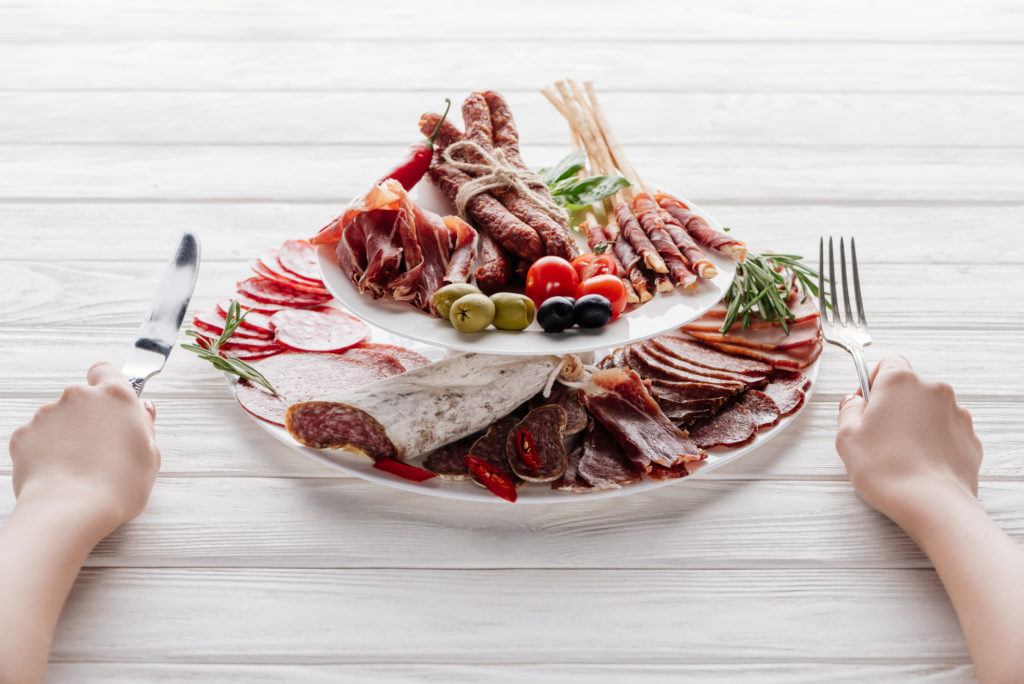There are many passages in the bible that reference eating meat, from Genesis to Romans.
In Genesis, the Bible tells us that God has provided food for us, from both living things and green plants. There is no part of the Bible that says eating meat is a sin in any way – but the Bible points out that eating meat out of gluttony while there is hunger is a contravention of the Lord’s way.
In Deuteronomy, the Bible says that those who crave meat, may eat meat whenever they desire. This reference is likely to refer to those with dietary restrictions or health needs, who require meat and cannot abstain from it at all.
Further references that we find to diet in the Bible prohibits certain foods, including pork. By many, this is seen to be a quotation that should be taken in a historical context. Conditions and hygiene were not of today’s standards, and meat that could spoil – such as pork – were not as available as it is today.
Most dietary restrictions in the Bible have reason for the time, but there is not necessarily any need to uphold these restrictions today (unless it is for specific health reasons, or a question of your own personal faith or feeling).
Contents
Is Eating Meat a Sin?
No, the Bible does not expressly say that eating meat is a sin.
Genesis is one of the first parts of the Bible that talks about meat, and the gift it can be from God.
The Bible says that God has given of us every moving thing as food, and the green plants. What God created has been created for food – but it aso comes together with the responsibility of being sustainable, eco-friendy, and making sure there is enough for everyone.
give you everything.” Genesis 9:3
Eating meat is not a sin, but gluttony is. One should never eat more than you need out of reckless abandon whilst you can see your neighbours go hungry. This is not in line with the Lord’s plan for us when we are taught to help others.
Should Everyone Eat Meat?
The Bible does not specify whether people should or should not eat meat. This is something that God leaves up to personal choice, and the Lord allows us for health reasons – some people can (or prefer to) be carnivores, while others do not.
The Bible makes a reference in Deuteronomy that directly says, those who require meat, may eat meat whenever they desire. This is likely a reference to the fact that dietary needs have always been taken into account – even in times of the Bible.
While some people cannot eat meat, others might have to for their health. This verse tells us that, if you need it, God will provide.
If we combine this important verse in Deuteronomy with what is said about living creatures (and green things), the Bible actually tells more than enough about a healthy diet.
The Bible also makes another reference to diet in Romans 14. Here, the Bible says that we should not quarrel over dietary opinions. Some people might believe that eating meat is what they should do, while others have to eat vegetables.
If we combine all these verses about diet, then the Bible tells us that there are different dietary requirements – but that the Lord can provide for all of them. It also tells us that there is no point to argue if we have different opinions about diet: arguments are what take us further away from being able to accept our brothers and sisters.
Is Eating Too Much Meat a Sin?
The Bible does not say that eating meat is a sin.
Instead, the Word tells us that there is plenty for everyone. The Bible also tells us about dietary restrictions – and if you need it, God can provide ample amounts of meat or vegetables.
The Bible does, however, tell us that indulgence and gluttony are sins.
It’s okay to eat what you need, but it’s not okay to eat more than you need whilst those close to you are going hungry. This is a test of our faith, and one that we might undergo often. The Bible tells us that we should not go beyond our limits, or carry on like thieves and gluttons.
In Romans, the Bible tells us that it’s not good to eat meat or drink wine when it causes our fellow people to stumble. It’s okay to eat meat, but not okay to be a glutton.
stumble.” Romans 14:21
The Bible also tells us in 1 Corinthians that we should do whatever we do (including eat and drink) to the glory of the Lord. If you have had the honor to eat, remember to thank the Lord and help others when it is possible through what you have received.

The Bible and Diet
There are parts of the Bible that talk about dietary restrictions, and some things that people in Biblical times could not (or did not) choose to eat. In modern times, these dietary restrictions are considered a sign of the times (and not necessarily practiced by everyone today).
Here’s what the Bible has to say about dietary restrictions of the time.
What Are Religious Dietary Restrictions?
Within Leviticus, appears one of the most well known Bible verses about diet. Here, it says that animals with cloven hooves (and rock badgers) are not part of our diets because it is considered unclean.
Why do some people still choose to eat meat like pork?
These dietary restrictions, including the ones mentioned in Leviticus, are contextual for Biblical times. People in ancient times did not have the same access to hygiene, running water and other supplies – and it was much more difficult to control, for example, infections amongst hooved animals.
There are more references to animals in the Bible that people did not (or could not) eat. Wild goes, ibexes, antelopes and sheep. Today, Christians can and do eat sheep all the time – and it has no negative impact on their faith.
If these references are taken into historical context for the Bible, there are very few actual dietary restrictions – and nowhere does the Bible prohibit us eating meat.
What Does Food Have to Do With Faith?
The Bible tells us, in 1 Corinthians, that food will not bring us to the Lord – and we are no worse if we eat than if we don’t for our faith. This tells that we are not religious (or not) by the food we choose to eat – but faith is all about pure faith.
Another passage in the book of Matthew makes this reference even more clear, when it says that it’s not what goes into the mouth that defiles a person – but what comes out of it! Our thoughts, actions and words will have more of an impact on our faith than anything we might choose to eat – or not.
Why Don’t We All Follow the Biblical Diet Today?
We don’t all follow the Biblical diet today, because there are different ways to farm – and effective ways of guaranteeing clean, healthy, and refrigerated meat. In Biblical times, this was not quite as possible as today – and some types of meat were considered a risk that many people do not take.
Deuteronomy tells us that the Lord God willl provide meat if that is what you need.

